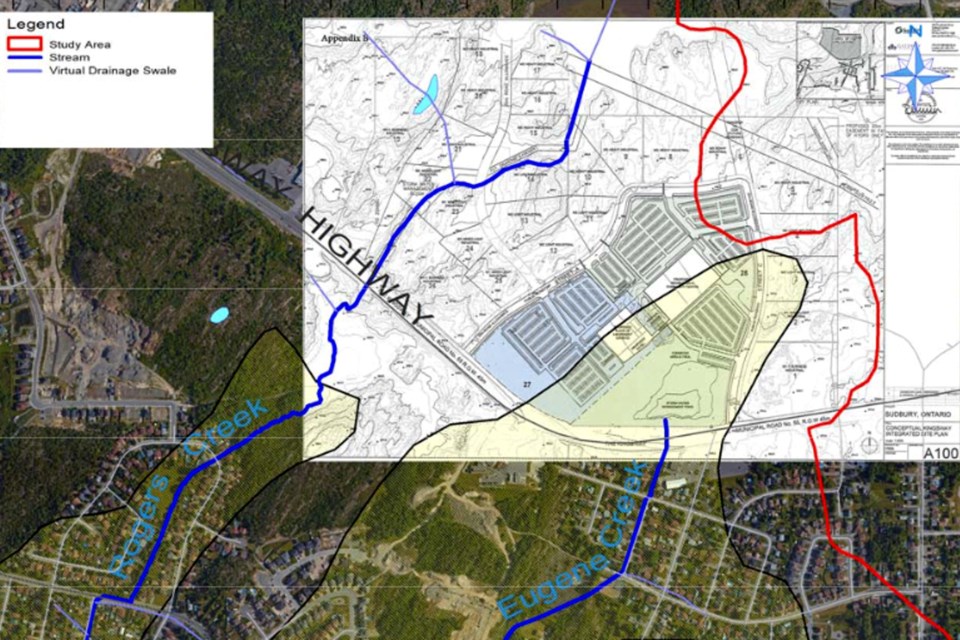With the Kingsway Entertainment District raising concerns for its potential impacts on Ramsey Lake, a motion was passed by city council tonight for city administration to further look at limiting the use of road salt.
“The health of the main source of drinking water for some 60,000 of our residents is obviously not something that we take lightly, so when it comes to issues like this I think this motion is in order,” Ward 10 Coun. Fern Cormier said while introducing tonight’s motion, which he co-presented alongside Ward 9 Coun. Deb McIntosh.
The motion, which was passed unanimously by city council, calls on city administration to present a report to city council outlining how their stormwater management plan for the KED will adhere to the recently released Ramsey Lake Subwater Study and Stormwater Master Plan.
Staff are also asked to present alternatives to the use of sodium chloride (road salt) for the “safe winter management of roads, parking lots and pedestrian pathways within the KED at the city council meeting of July 12, 2022.”
“We can control our salt usage at municipally owned properties at a cost, but I hope that we can also convince our partners on this project to adopt the same protective measures,” McIntosh said. Genesis Hospitality is slated to build and operate a private hotel, which is expected to join a Gateway Casinos facility at a property on The Kingsway centred around a municipal arena/events centre.
The project’s environmental impacts have long been a point of contention among its opponents.
Although the Minnow Lake Restoration Group instigated a judicial review of the Kingsway Entertainment District based on an allegation the city failed to follow procedure, their chief concern has always been environmental in nature.
“We shouldn’t develop any more roadways around the lake,” group president John Lindsay told Sudbury.com a few months ago. “We shouldn’t develop huge parking lots because parking lots and roadways are the largest contributor of sodium and chloride into the lake.”
These concerns were raised in the Ramsey Lake Subwatershed Study and Master Plan released in February, which noted the KED would have a “measurable impact” on Ramsey Lake. The facility is set to be located on a Significant Groundwater Recharge Area at the headwaters of Eugene Creek, which flows into Ramsey Lake.
“The enhanced runoff from the upland areas may locally increase downslope groundwater recharge, and the water quality of the runoff may be detrimental to the ecology of the headwaters if the runoff contains road salt,” according to the study.
During tonight’s meeting, Cormier reminded his colleagues on city council that people who are on salt-restricted diets are already being advised against consuming tap water, and that Ramsey Lake can’t be desalinated.
In March, city engineering services director David Shelsted told Sudbury.com that, as with other municipal parking lots, those associated with the KED will be sanded and not salted, while the ring road encircling the property is likely to be salted due to traffic volume.
Shelsted also noted that the land on The Kingsway where the KED is proposed to be located was previously zoned as industrial, and that its current zoning to accommodate the KED is “one of the least impactful developments you can have” at the property.
A stormwater management pond has been planned to filter stormwater through a weeping tile-style system before it flows downstream to Ramsey Lake, but would have little impact on road salt. A risk management plan will also be followed to mitigate the impacts of road salt.
Components of this plan are likely to be included in the report to be presented to city council on July 12, alongside potential alternatives to salt, which city council has investigated and received reports on in the past.
“Alternatives to road salt are generally prohibitively expensive, not appropriate for use on public roadways, unproven in a large-scale operation and in many instances an alternative form of salt,” a 2018 report from city administration informed city council.
A report by Sudbury.com at the time noted that road salt was approximately $60 per metric tonne and that an alternative chemical, calcium chloride, was $660.
Tyler Clarke covers city hall and political affairs for Sudbury.com.
